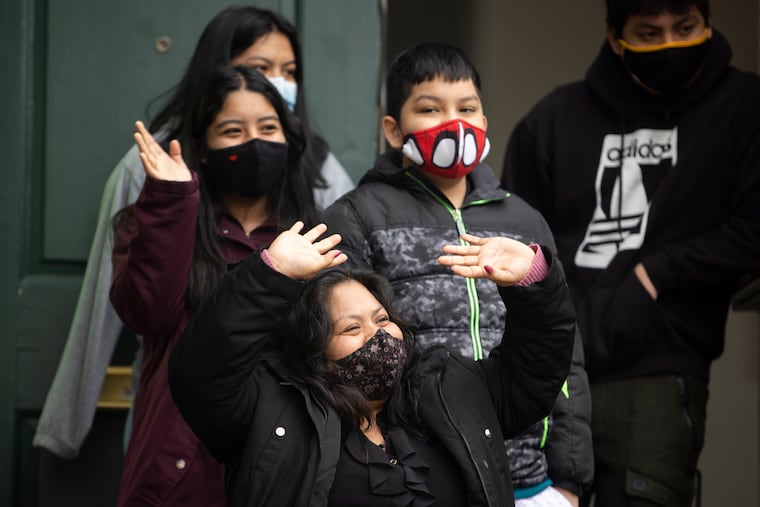Carmela Hernandez formally ends more than three years in Philly church sanctuary
The move inside, first to one church, then to another, shielded Hernandez and her four children from deportation.

Again and again, Carmela Apolonio Hernandez said, she asked God: When can I leave these church walls and end this time in sanctuary?
Finally, she said, she got her answer: Today is the day that you’re free, Carmela.
Shortly after 11:30 a.m. Wednesday, Hernandez and her four children walked out of the Germantown Mennonite Church, officially concluding three years and three months in sanctuary — longer than anyone in Philadelphia during the last five years.
“I’m so happy,” Hernandez said, speaking to two dozen supporters and half a dozen television cameras. “I’ll never be able to thank you for all that you’ve done. ... I was lucky to find some angels, who wrapped their arms around me.”
She cried only once, and briefly, looking out at all the familiar faces, people who supported the undocumented Mexican mother in her battle to stay and live freely in the United States. The move inside, first to one church, then to another, shielded Hernandez, 39, and her two sons and two daughters from deportation to a homeland where they could have been killed.
Immigration and Customs Enforcement officials told The Inquirer last week that Hernandez was no longer “a priority for enforcement,” later confirming she fell outside new guidelines that target threats to national security, border security, and public safety.
On Wednesday, the people who were there at the beginning were there at the end. They couldn’t gather close as in the past, to share a meal or strategy session with the family, but stood in the church parking lot, masked and socially distanced.
The children who were babies when Hernandez entered sanctuary are toddlers now, and they were there, out of their mother’s arms and on their own feet, holding small signs that said, “Freedom.” Their mom, Julia Shields Chrestay, was part of Hernandez’s support team.
The gray, veteran activists had gotten a little grayer.
“Freedom is never free,” the Rev. Renee McKenzie told the crowd. “Sometimes you just have to grasp it and take it because it’s yours, and you’re not going to let anyone take it from you.”
It was McKenzie who, at the start, on a moment’s notice, welcomed a desperate Hernandez family into the Church of the Advocate in North Philadelphia.
Councilmember Helen Gym was there. On the late-August day in 2018 that the Hernandez children braved exposure, traveling to public school, it was Gym who walked beside them.
Hernandez’s attorney, David Bennion, stood in the crowd, still working now, after years, on a permanent solution to her case. And Blanca Pacheco and Peter Pedemonti, the codirectors of New Sanctuary Movement of Philadelphia, who at the end of each day carried home Hernandez’s stress and fear as if it were their own.
No one — friends, activists, clergy, attorneys, city officials — could quite believe it was over, after years of marches, petitions, and protests.
“It’s really an amazing day,” Pedemonti said. “Carmela is a strong, amazing person.”
A cool, misty rain could not dampen the joy — nor the noise, the applause and cheering and banging tambourines that rang when the family stepped outside.
“This is a day that is 40 months in the making,” said the Rev. John Bergen, who helped the family at the Germantown church, and noted that biblically, 40 is a number of patience. “We’re so glad we get to celebrate the victory that comes when we work together.”
Hernandez is looking for a house to rent, and to continue guiding her children to build their futures. New Sanctuary Movement is raising money to help pay their living expenses outside of the church.
Despite ICE not making them a priority, Hernandez and her children — Fidel, 18; Keyri, 16; Yoselin, 14; and Edwin, 12 — still carry final deportation orders.
Even free from sanctuary, Hernandez has no permission to work in the United States. She’s counting on getting a U visa, which can go to undocumented immigrants who help the police solve crimes, to allow her and her children to stay and work here.
Hernandez’s children were assaulted during a 2019 church break-in. She also is appealing the denial of an earlier U visa application, which she sought as the victim of a 2017 attempted extortion in New Jersey.
Hernandez fled to this country in August 2015 after being threatened by the same drug criminals who killed her brother and two nephews. The family was denied asylum and took sanctuary only days before a Dec. 15, 2017, deportation date, living first in the Church of the Advocate and, since December 2018, in the Germantown church.
Churches are considered safe places because ICE “sensitive locations” guidelines dissuade agents from making arrests at schools, hospitals, and houses of worship.
As far as is known, Hernandez left sanctuary only once, for one day, on Oct. 10, 2018, to try to confront Sen. Bob Casey about her immigration case at his Center City office. He was not there, and she returned to sanctuary that night after she and her supporters staged a sit-in.
“I’m happy, and I’m finally free with my children,” Hernandez said Wednesday. “In the church, I laughed, I cried, all kinds of things happened. But the most important thing is I’m free.”